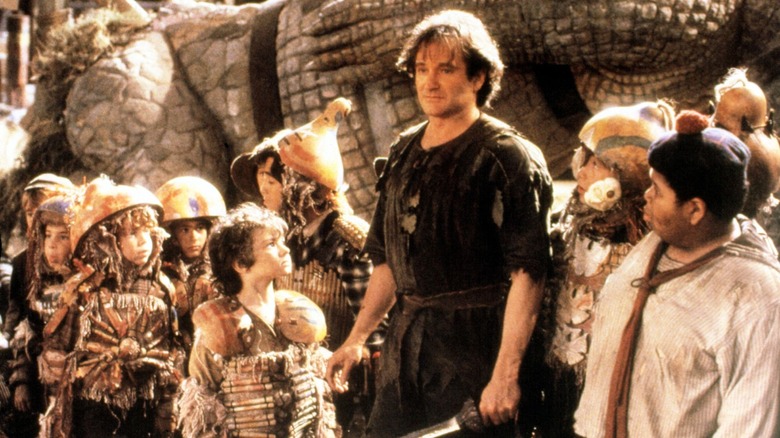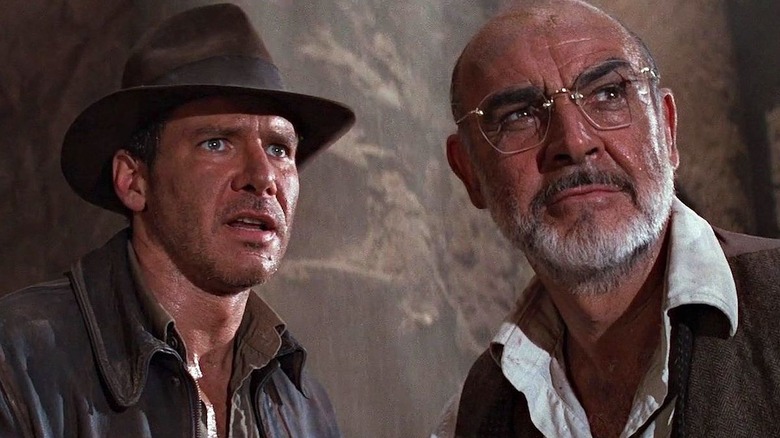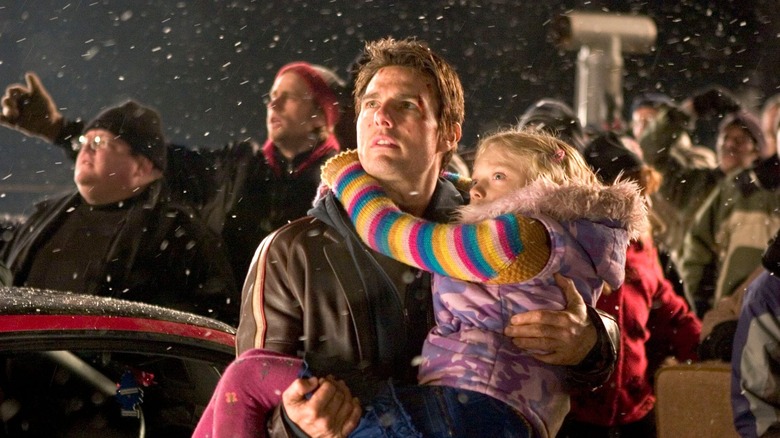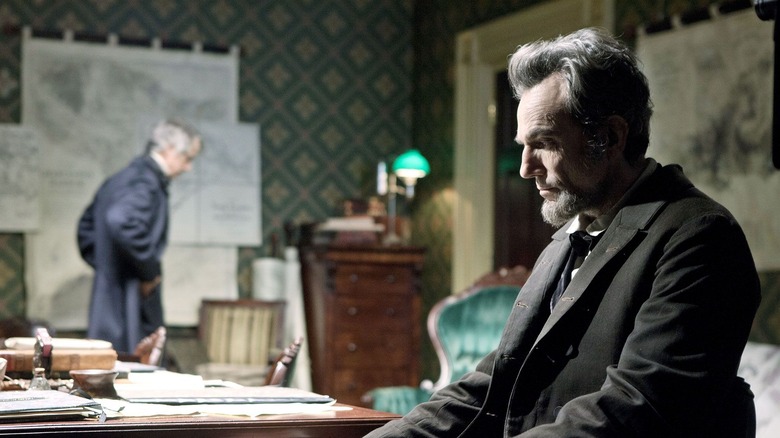Why You See So Few Fathers In Steven Spielberg Movies
Heralded as one of the most talented filmmakers of his generation, Steven Spielberg is particularly noted for his ability to capture the whimsy of childhood. However, the director has also imparted his filmography with a certain cynicism concerning the nuclear family dynamic — a component of his work said to be inspired by the dissolution of his own parents' marriage.
Though his parents divorced due to his mother's extramarital affair, Spielberg always harbored resentment toward his father while shifting the blame away from his mother. In a 2012 interview with Leslie Stahl for "60 Minutes," the director explains how his parents' failed marriage inspired one of his most successful films:
"'E.T.' began with me trying to write a story about my parents' divorce," the director said. "Even after I knew the truth, I blamed my dad. It's still a mystery to me, but even though my mother was kind of like an older sister to me, I kind of put her up on a pedestal. And my dad was much more terrestrial, much more grounded, much more salt of the earth. And for some reason, it was easier for me to blame him than it was to someone who I...already exalted."
While "E.T.: The Extra Terrestrial" is considered the most definitive exploration of the divorce that profoundly affected a young Spielberg, there's an overarching interest in depicting imperfect families amid fantastical scenarios — contrasting the beauty of imaginary reverie with the painful reality of fractured families.
Read on to further understand the nuances of this recurring thematic thread in Spielberg's work, including the director's recent shift toward positive fatherly figures ahead of his own semi-autobiographical feature.
Daddy wasn't there: Absentee, workaholic, and neglectful fathers in Spielberg's work
From his first theatrical feature to his latest theatrical release, the director has made a point in highlighting strained relationships with patriarchs, particularly when it comes to father-son dynamics. If the father isn't outright neglectful or a disconnected workaholic, he's absent entirely — while single mothers or strong matriarchs tend to keep things together in their place.
We first see this motif in "The Sugarland Express," the 1974 crime thriller directed by a 26-year-old Spielberg in his theatrical feature debut. Loosely based on a real-life occurrence, the film follows a husband (William Atherton) who breaks out of jail in order to aid his wife (Goldie Hawn) in an ill-conceived scheme to regain custody of their son from foster care. Though the formerly incarcerated father eventually perishes, the child's mother is granted custody after serving a short prison sentence. Though both parents are equally involved in the illegal odyssey, the father is unceremoniously killed by police while the mother ascends to coveted caregiver status.
Immediately following "The Sugarland Express" is "Jaws," the film that shot the director to mainstream success and created the concept of a "summer blockbuster." Though Chief Brody (Roy Scheider) is the film's protagonist, Spielberg demonstrates the obsessive grip the shark hunt has on him through Brody's increased distraction from his family life. In fact, he nearly gets his two sons killed when he directs them away from the ocean and suggests they play in the lagoon — putting them right in the great white's new hunting ground. While no harm comes to his sons and Brody is totally redeemed by the film's fiery conclusion, the director's work from here onward scrutinizes these father figures much more intensely. For the sake of brevity, here are a few notable examples of this trend in Spielberg's catalog:
"Close Encounters of the Third Kind" (1977): After encountering a UFO, electrician Roy Neary (Richard Dreyfuss) becomes entirely consumed with visions of the Devil's Tower mountain, causing his wife to take their three children and leave. Similarly, single mother Jillian Guiler has her child abducted by aliens and becomes hell-bent on making contact with them again to retrieve her son.
"E.T.: The Extra Terrestrial" (1982): Another note on this divorce-inspired piece of cinema is that the character of E.T. was based on the director's own imaginary friend at the time of his parents' separation, a friendly alien companion that helped the director foster his earliest daddy issues.
"Indiana Jones and the Last Crusade" (1989): The tension between Henry "Indiana" Jones, Jr. (Harrison Ford), and his father, Henry Jones, Sr. (Sean Connery), comes to a boil over the search for the Holy Grail — a relic that Henry Sr. has spent much of his professional career hunting, often relinquishing fatherly duties in his frenzied pursuit.
"Hook" (1991): A workaholic lawyer, Peter Banning (Robin Williams) ventures to Neverland in order to rescue his two children from the dreaded Captain Hook (Dustin Hoffman), allowing him to reconnect with his childlike alter-ego of Peter Pan.
"Jurassic Park" (1993): Protagonist Dr. Alan Grant (Sam Neill) can't stand children, initially reacting with profound annoyance to the presence of John Hammond's children. He's a sour foil to Dr. Ellie Sattler (Laura Dern), who visibly adores children and thinks Alan's interaction with Hammond's grandkids will "be good for him."
"The Lost World: Jurassic Park" (1997): Chaos theorist Ian Malcolm (Jeff Goldblum) returns as the lead in the franchise's sequel, though he's depicted as a bumbling dead-beat of a dad. He somehow manages not to notice his daughter Kelly (Vanessa Lee Chester) stowing away on the vessel headed toward the dino-infested Isla Sorna.
"A.I. Artificial Intelligence" (2001): Though husband Henry Swinton (Sam Robard) is the one who convinces his wife Monica (Frances O'Connor) to adopt David (Haley Joel Osment), a Mecha child capable of love, he forces her to give him up after David nearly drowns their biological son Martin (Jake Thomas). In attempting to protect his blood relative, he cruelly sacrifices the life of another autonomous being who has been programmed to love him despite his rejection.
"Catch Me If You Can" (2002): Teenage con artist Frank Abagnale (Leonardo DiCaprio) first resorts to his dishonest ploys after his father's (Christopher Walken) IRS troubles force the family to move into a smaller apartment. Eventually, his mother (Nathalie Baye) engages in an extramarital affair and the couple divorces — coincidentally mirroring the circumstances of Spielberg's parents' divorce, despite the screenplay being written by Jeff Nathanson.
"Catch Me If You Can" is perhaps where the hard line is drawn in terms of Spielberg's shift toward portraying fathers in a different light on-screen, focusing on unconditional love and heroic acts in lieu of less than perfect portrayals. Yet the insertion of strong maternal figures has remained a mainstay in the director's work: just look at the gender-bent slant of Rita Moreno playing doc's wife Valentina in his recent "West Side Story" reboot, having Tony (Ansel Elgort) find his greatest confidant and supporter in the Puerto Rican woman.
The exceptions to the rule
This shift in Spielberg's oeuvre is likely due to the real-life reconciliation he experienced with his father after an extended 15-year estrangement. "My dad and I had an amazing reconciliation, which is going on almost 18 years, where we have really, really been in each other's lives," he says in the "60 Minutes" interview.
The director's films following "Catch Me If You Can" tend to center on a father either overtly protecting or finding immense pride in his children. "War of the Worlds" in 2005 finds Ray Ferrier (Tom Cruise) fleeing an alien invasion while attempting to shepherd his two children to safety, inverting the role of protector from single mother onto single father. In "War Horse," Albert's (Jeremy Irvine) forges a bond with an Irish Hunter colt after his father purchases it at auction, and he learns of his father's bravery during combat, ostensibly setting the gears in motion for Albert's own enlistment in World War I years later. "Lincoln" also emphasizes the former president's fatherly virtue, particularly when it comes to his eldest son's desire to fight alongside the Union Army during the Civil War.
With these three notable exceptions to the negligent father trope in Spielberg's work, there has also been a heightened presence of orphaned children. Both "Ready Player One" and "BFG" feature young protagonists who are explicitly stated to be without parents, both choosing to reside in realms of fantasy in order to escape their bleak realities. Whether this narrative decision is integral to Spielberg's existing preoccupation with the role of parents in his films is debatable, the director's forthcoming project is inextricably tied to his parents and the filmmaker's own lived experiences.
Spielberg's future work featuring Daddy Dano
Instead of grappling with the weight of his parents' influence through fictional exposition, the 75-year-old director will direct fictional versions of his mother and father in his forthcoming 2022 semi-autobiographical project titled "The Fabelmans."
Chronicling the events of the director's own childhood (albeit loosely), this film will perhaps be the definitive take on the director's complicated and changing relationship to the people who raised him. Though little is known about the film's explicit details, it is to follow a Spielberg self-insert named (and yet to be cast) Sammy through his childhood and teenage years. What is set in stone, however, is the film's cast. Michelle Williams will play a fictional version of his mother, while Paul Dano takes the loaded role of the director's father. Seth Rogen also joins the cast as Spielberg's supposedly favorite uncle — a character that might also shed some insight on positive father figures in the director's life while his own relationship with his dad was strained.
While Spielberg's filmography certainly contains enough fodder for a Freudian seminar on the imperfect antics of overworked, inattentive fathers, it appears audiences will get a conclusive take on the esteemed filmmaker's early years — a tale spun from the memories of one of the eminent masters in depicting childhood experiences and nostalgia.



